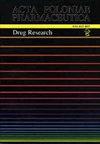Panax ginseng C.A. Mey. as a potential raw material in the treatment of negative effects of alcohol consumption
IF 0.4
4区 医学
Q4 PHARMACOLOGY & PHARMACY
引用次数: 0
Abstract
An alcohol hangover is a complex set of adverse symptoms that occur after excessive consumption of alcoholic beverages. Hangovers are not solely caused by ethanol, but mainly by its toxic metabolites, such as acetaldehyde and acetic acid. Most of the negative symptoms occur when the concentration of alcohol in the blood decreases after drinking. Given that a large percentage of people consume alcohol and experience negative effects from its consumption, potential supplementation to help eliminate these adverse effects has been proposed. One promising ingredient is ginseng, which has been used in Eastern culture and traditional Chinese medicine for over 2,000 years. The aim of this study was to present the potential of Panax ginseng C.A. Mey. as an aid for the adverse effects of alcohol consumption and its protective effect on liver function. The literature analysis was based on data indexed in medical databases PubMed, Scopus, and Medline since 2010, using keywords such as "Panax ginseng," "hangover," "alcohol consumption," and "metabolism," connected by the logical conjuction “and.” The analysis confirmed the effectiveness of P. ginseng in the treatment and prevention of hangovers. Preparations containing P. ginseng can support ethanol metabolism by inducing enzymes such as alcohol dehydrogenase, aldehyde dehydrogenase, and the cytochrome P450 isoform 2E1 system. An additional advantage of using P. ginseng may be its hepatoprotective effect.人参c.a.m y。作为治疗酒精不良反应的潜在原料
酒精宿醉是过量饮用酒精饮料后出现的一系列复杂的不良症状。宿醉不仅仅是由乙醇引起的,主要是由它的有毒代谢物,如乙醛和乙酸引起的。大多数阴性症状发生在饮酒后血液中酒精浓度下降时。鉴于很大比例的人饮酒并经历其消费的负面影响,已经提出了潜在的补充,以帮助消除这些不利影响。一种很有前途的成分是人参,它在东方文化和传统中医中已经使用了2000多年。本研究的目的是探讨人参c.a.m y的潜力。作为酒精消费的不良影响及其对肝功能的保护作用的辅助。文献分析以医学数据库PubMed、Scopus和Medline自2010年以来检索的数据为基础,使用“人参”、“宿醉”、“饮酒”和“代谢”等关键词,通过逻辑连接“和”连接起来。分析证实了人参在治疗和预防宿醉方面的有效性。含有人参的制剂可以通过诱导乙醇脱氢酶、醛脱氢酶和细胞色素P450异构体2E1系统等酶来支持乙醇代谢。使用人参的另一个好处可能是它的肝保护作用。
本文章由计算机程序翻译,如有差异,请以英文原文为准。
求助全文
约1分钟内获得全文
求助全文
来源期刊
CiteScore
0.80
自引率
0.00%
发文量
74
审稿时长
6-12 weeks
期刊介绍:
The international journal of the Polish Pharmaceutical Society is published in 6 issues a year. The journal offers Open Access publication of original research papers, short communications and reviews written in English, in all areas of pharmaceutical sciences. The following areas of pharmaceutical sciences are covered: Analysis, Biopharmacy, Drug Biochemistry, Drug Synthesis, Natural Drugs, Pharmaceutical Technology, Pharmacology and General.
A bimonthly appearing in English since 1994, which continues “Acta Poloniae Pharmaceutica”, whose first issue appeared in December 1937. The war halted the activity of the journal’s creators. Issuance of “Acta Poloniae Pharmaceutica” was resumed in 1947. From 1947 the journal appeared irregularly, initially as a quarterly, then a bimonthly. In the years 1963 – 1973 alongside the Polish version appeared the English edition of the journal. Starting from 1974 only works in English are published in the journal. Since 1995 the journal has been appearing very regularly in two-month intervals (six books a year). The journal publishes original works from all fields of pharmacy, summaries of postdoctoral dissertations and laboratory notes.

 求助内容:
求助内容: 应助结果提醒方式:
应助结果提醒方式:


